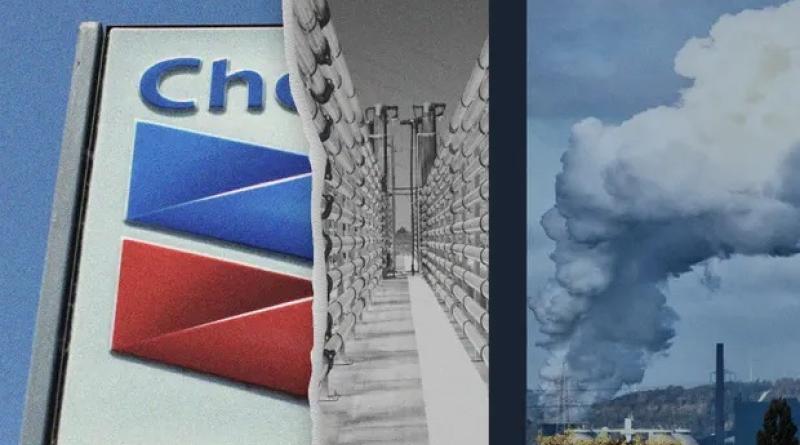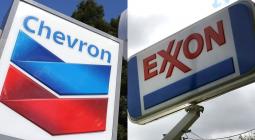Worthless’: Chevron’s carbon offsets are mostly junk and some may harm, research says

A new investigation into Chevron’s climate pledge has found the fossil-fuel company relies on “junk” carbon offsets and “unviable” technologies, which do little to offset its vast greenhouse gas emissions and in some cases may actually be causing communities harm.
Chevron, which reported $35.5bn in profits last year, is the US’s second-largest fossil fuel company with operations stretching from Canada and Brazil to the UK, Nigeria and Australia.
Despite major expansions in five continents, Chevron has said that it “aspires” to achieve net zero upstream emissions by 2050. To do this, it is mostly relying on carbon offset schemes – environmental projects meant to cancel out its greenhouse gas emissions – and carbon capture and storage (CCS) technologies.
New research by Corporate Accountability, a non-profit, transnational corporate watchdog, found that 93% of the offsets Chevron bought and counted towards its climate targets from voluntary carbon markets between 2020 and 2022 were too environmentally problematic to be classified as anything other than worthless or junk.
A carbon offset is characterized as having low environmental integrity, or being worthless, if it is linked to a forest or plantation or green energy project, including those involving hydroelectric dams, that doesn’t lead to additional greenhouse gas reductions, exaggerates benefits or risks emitting emissions, among other measures.
Many of Chevron’s offset purchases focus on forests, plantations or large dams.
According to the report shared exclusively with the Guardian, almost half of Chevron’s “worthless” offsets are also linked to alleged social and environmental harms – mostly in communities in the global south, which are also often the most affected by the climate crisis.
“Chevron’s junk climate action agenda is destructive and reckless, especially in light of climate science underscoring the only viable way forward is an equitable and urgent fossil fuel phase-out,” said Rachel Rose Jackson from Corporate Accountability.
The report, Destruction Is at the Heart of Everything We Do, comes amid a week of global protests by communities affected by Chevron’s oil and gas businesses, as the California-headquartered company prepares for its annual shareholders meeting on 31 May.
On Sunday in Richmond, a majority Black and brown city of 115,000 people just north-east of San Francisco, activists gathered in front of the sprawling Chevron oil refinery. In 2012, 15,000 people required medical help after a huge fire caused by the company’s criminal negligence. Asthma rates are far higher in Richmond than the state and national averages.The report argues that the widespread use of worthless offsets severely undermines Chevron’s climate action ambition, which in any case is limited to a tiny fraction of its business. Chevron’s net zero aspiration only applies to less than 10% of the company’s carbon footprint – the upstream emissions from the production and transport of oil and gas, while excluding downstream or end-use emissions from burning fossil fuels to heat homes, power factories and drive cars.
Any climate plan that is premised on offsets, CCS, and excludes scope 3 [downstream] emissions is bound to fail,” said Steven Feit, fossil economy legal and research manager at the Center for International Environmental Law.
“It’s clear from this report and other research that net zero as a framework opens the door for claims of climate action while continuing with business as usual, and not moving towards a low-carbon Paris [agreement]-aligned 1.5-degree future.”
Chevron’s projected emissions between 2022 and 2025 are equivalent to the emissions from 364 coal-fired power plants annually – and dwarf the total emissions of 10 European countries combined for a similar three-year period: Austria, Norway, Sweden, Switzerland, Denmark, Lithuania, Slovenia, Estonia, Latvia and Iceland.
In a statement sent after the publication of this article, Chevron rejected the findings of the report, saying it was biased against its industry and painted an incomplete picture of its efforts to advance a low carbon future.
It is the latest research to call out carbon offsets and carbon capture as false climate solutions, given that both enable – even encourage – polluters to keep emitting greenhouse gases.
Earlier this year, a Guardian investigation revealed that the forest carbon offsets approved by Verra, the world’s leading certifier which is used by Disney, Gucci, Shell and Chevron, are mostly junk and could make global heating worse.
Experts say that the findings shine a light on the broader strategy to undermine and delay meaningful climate action. “This is how we lose a planet: through corporate dishonesty and obstruction,” said Peter Kalmus, a Nasa climate scientist speaking on his own behalf.
“This deeply documented history of greenwashing and malfeasance should make every human on Earth who isn’t paid by the fossil fuel industry furious,” added Kalmus.
The International Energy Agency (IEA) warned back in 2021 that there could be no further expansion of oil, gas and coal production if the world is to stay within the safe limits of global heating at 1.5C and have any chance of avoiding catastrophic climate breakdown.
Yet fossil fuel companies such as Chevron have continued to expand apace, and a recent study found that the world is on track for an increase of 2.7C, which will lead to “phenomenal” human suffering.
In recent years, vast amounts of time and resources have been invested into schemes and technologies that trade, cap and capture – rather than cut – greenhouse gas emissions.
Today’s report into Chevron’s climate action found:
1. Chevron relies almost totally on junk carbon credits to offset its upstream greenhouse gas emissions.
A carbon offset credit is a tradable “right” or certificate that allows the purchaser to compensate for 1 ton of carbon dioxide or the equivalent in greenhouse gases by investing in emissions-reducing environmental projects elsewhere.
The voluntary carbon offsets market is worth $2bn – and growing rapidly – despite little evidence of positive climate impact.
Between 2020 and 2022, Chevron “retired” or cashed in 5.8m carbon credits – mostly through four major voluntary carbon market project registries, according to the AlliedOffsets database.
Corporate Accountability found that almost all of the carbon offsets Chevron bought and counted towards its climate targets had “low environmental integrity” and should therefore be presumed to be junk.
Projects categorized as junk offsets include those certified by a carbon standard with demonstrated low environmental integrity.
cover photo:New research finds that more than 90% of the company’s carbon offsets should be classified as worthless or junk. Composite: The Guardian/Getty Images






